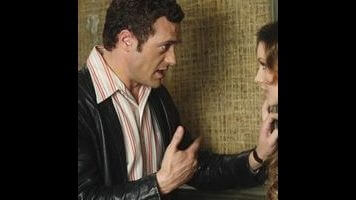Life On Mars: "Out Here in the Fields"

Sam Tyler (Jason O'Mara) is a New York City police detective, and like apparently every New York City detective, he's hunting a serial killer. He thinks he's found his man, but the guy's lawyer comes up with an airtight alibi; at least, that's what it looks like. Maya (Lisa Bonet), another cop who happens to be Sam's girlfriend, isn't convinced. She follows their suspect to a park, and just as Sam finds evidence that the suspect's alibi wasn't quite so perfect after all, Maya disappears, leaving behind nothing but a bloody shirt on a playground ride. Sam rushes to the suspect's last known address–but before he can get inside, he's run down in the middle of the street.
When he comes to, he's wearing a leather jacket and wide lapels, he's lying in a vacant lot, and off in the New York city skyline, the Twin Towers are standing straight into the heavens. Sam's from 2008–but now it's 1973. Do you know where your temporally misplaced life is?
Life On Mars started life as a British series. I can think of a few reasons to import it stateside; the premise is brilliant (and we'll be getting more into that in a second), and cop shows are as much an American tradition these days as French fries and attack ads. But I think that shot of the World Trade Center in the opening, the last thing we see before the title card, was the clincher. We get another view of the Towers at the end, and it's a little much; but that first glimpse is as striking as it is blatant. Whether or not the show's creators plan on doing more with that moment remains to be seen.
Back to the plot. Not having anything better to do, Sam goes to the station house where he works, and finds things are running a lot differently than he remembers. The place is a boy's club, everybody looks like they're dressed for Serpico auditions, and the head man, Lt. Gene Hunt (Harvey Keitel), is an irritable, violent thug. All the technology Sam's lived with most of his professional life hasn't been invented yet; the rules are simpler now. Beat a witness till they confess, or until you get bored. Warrants are for morons, and a suspect's rights begin and end from the moment you get the cuffs on them.
It's chaos, but it's all Sam has to work with. And he's got to get his balance quick, because a body's been found, and the cause of death matches the M.O. of the serial killer who kidnapped Maya three decades into the future. Not sure if he's hallucinating, insane, or if everything that's happening to him really is real, Sam sets out to track down the killer; maybe if he catches the bad guy in the past, Maya will be safe in the present. At the very least, it's something to do.
Ambiguity is a hard note to hit on genre TV. We're an audience of Mulders at this point, trained to accept the most improbable solution to any problem simply because that's nearly always the answer. That's what makes the best story, after all. If there's a possibility of the occult, that's the possibility with the edge; unless we're watching a series that sticks to "real world" rules (ala Law & Order), that thing that everybody doesn't want to believe is actually happening? That's the thing to watch.







































